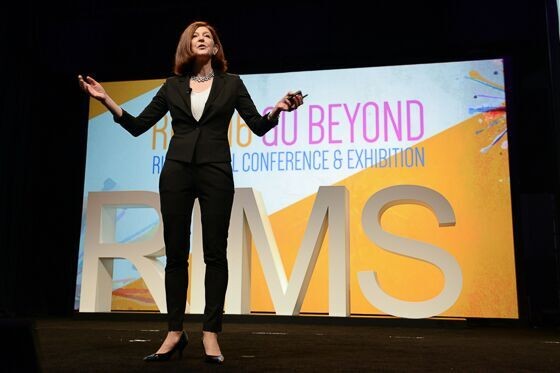
SAN DIEGO—Just to be clear, we’re all liars. What’s more, the better we think we are at spotting a lie, the worst we are in reality, lying expert Pam Meyer is quick to point out.
Meyer, certified fraud examiner and a keynote speaker here at the annual RIMS conference, said that we are also gullible to lies.
“Ask yourself, I am hungry for  X,” she said. Once we figure out what our own weakness is, we can become less of a target. “Pursue that hunger,” she said.
X,” she said. Once we figure out what our own weakness is, we can become less of a target. “Pursue that hunger,” she said.
There are lies and then there are lies. There are the corporate fraud kind, which cost billions annually, the lies we use every day to protect ourselves or others—lying about small things to a partner or people we know.
To spot a liar, she looks for too much or too little detail in people’s statements, speaking in the wrong tense and repeating a question to stall for time—think Bill Clinton, whose formal language used when denying any wrongdoing with Monica Lewinsky gave him away; Susan Smith, who drowned her two children, but spoke in the past tense about them before a crime was proven; and Bill Cosby, who when asked if he committed any crimes against his accusers, completely dodged the question, giving a nonsensical answer.
She also looks for:
- Lip smacking/biting
- Grooming gesture
- Hand wringing
- Excessive sweating
- Closed eyes
- Slumped posture
- Lowered Voice
Body language cues can also include giving the opposite of the words—such as shaking the head while saying yes or shrugging the shoulders while telling a confident, good story.
When trying to determine honesty or deception, look for these attitude giveaways:
- An honest person will be enthusiastic and help brainstorm to discover the real suspect.
- An honest person will be infuriated throughout the whole process if they suspect they are being accused – it won’t just be in flashes.
buy proscar online haveagreatsmile.com/wp-content/uploads/2023/10/jpg/proscar.html no prescription pharmacy
- An honest person will want a strict punishment for the person who committed the crimes.
- In contrast, a deceptive person will talk only in chronological order and get confused when asked to tell it differently, changing the order.
- A deceptive person will be withdrawn from the conversation.
- A deceptive person will add way too much irrelevant detail.
Spotting a liar isn’t always possible, but when you practice lie-spotting skills by combining the science of recognizing deception with the art of looking and listening, you exempt yourself from collaborating in a lie, Meyers said. “You start being a little bit more explicit, because you signal to everyone around you that your world will be an honest one, where truth is strengthened and falsehood is recognized and marginalized.
”
